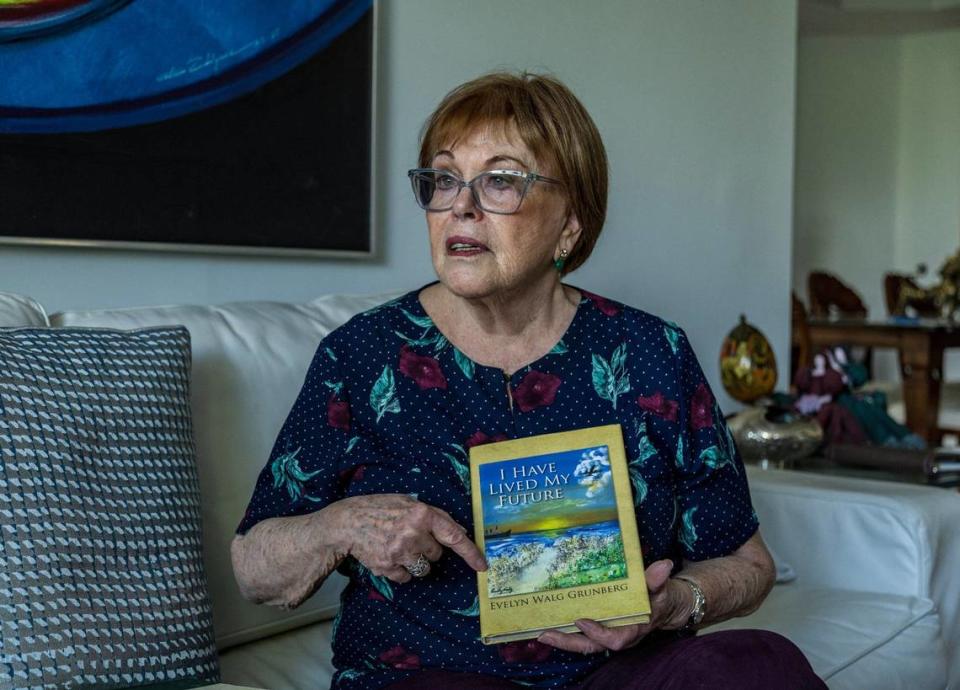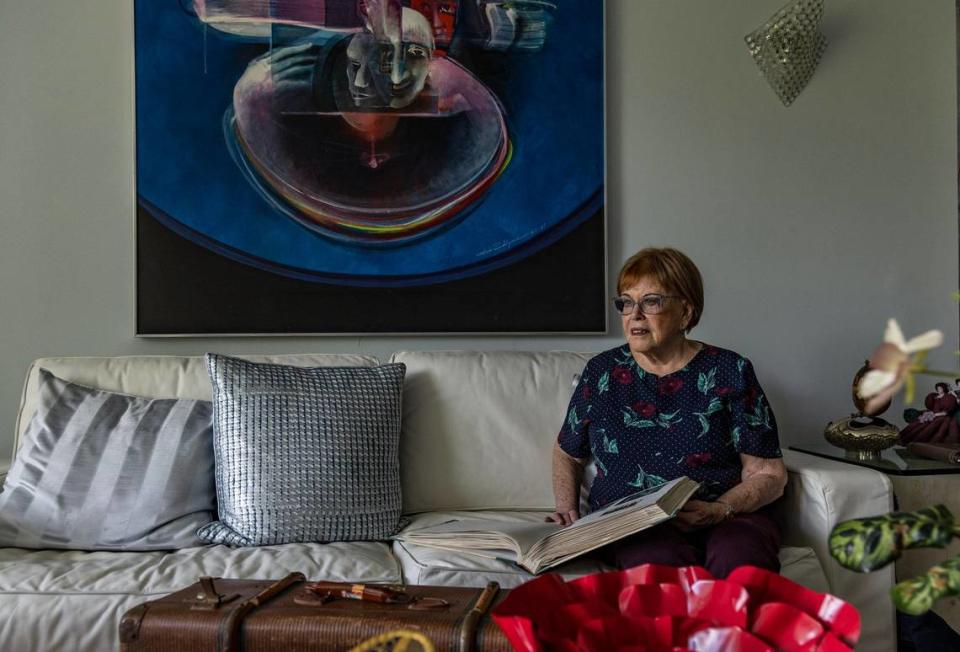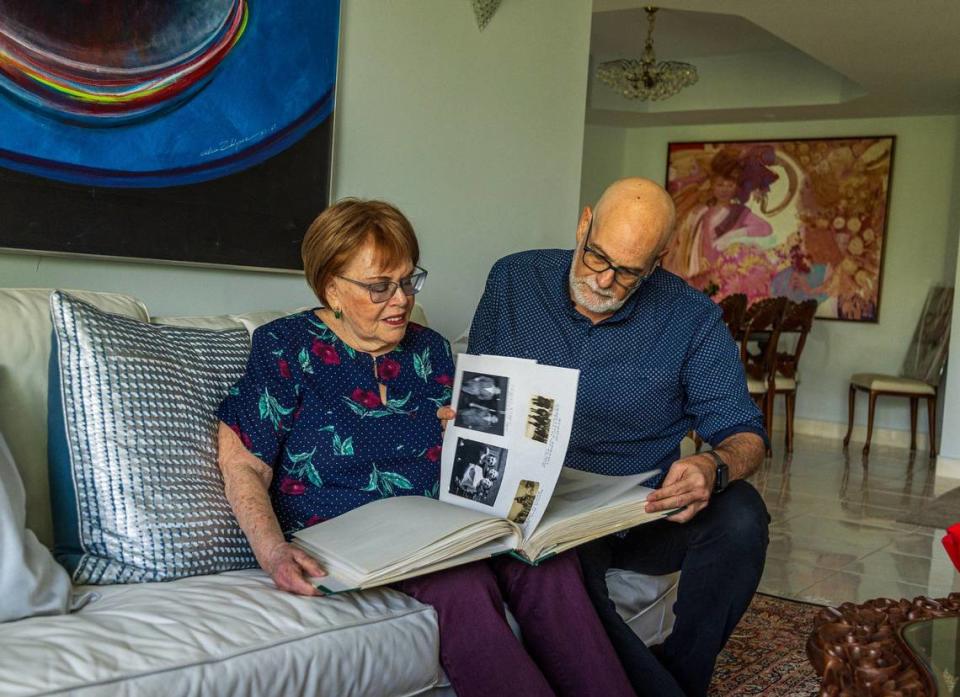Escaping the Holocaust: A Miami family plans to retrace grandmother’s perilous flight
For much of her life, Evelyn Walg Grunberg never talked about the past.
In 1942, Grunberg and her parents escaped Nazi persecution in France by trekking for three days and three nights through the Pyrenees, a mountain range that straddles Spain and France. Only three years old at the time, Grunberg remembers little. It was snowing. She rode on her father’s shoulders for much of the painstaking journey. He was exhausted, but continuing on was a matter of life and death.
“The guy told him, ‘if you don’t walk, I kill you. Because we’re not going to sacrifice the rest of the people,’” Grunberg said, recalling what her father told her.
At 85 years old, Grunberg has many stories about her life, some more painful to revisit than others. Now, a longtime Aventura resident with a large family of her own, Grunberg is finally ready to remember her past. This Holocaust Remembrance Day (Yom HaShoah), which began Sunday evening and concludes on Monday, is a special one for the entire Grunberg family. This summer, they will commemorate the family’s history by taking a trip to the Pyrenees to retrace Grunberg’s journey to freedom.
Joined by a historian and over 60 family members, those who are able will walk the same route that Grunberg took with her mother and father, retracing their steps, learning about the horrors of the Holocaust and its impact on future generations.
“I find it very very nice. It’s a great idea, especially 82 years after. It’s a long time.” Grunberg said.
Grunberg, who was born in Brussels, hopes to meet family members for the first time while learning more about the escape route that thousands of Jews took to flee France.
“I think it’s unbelievable. All of a sudden, descendants from all over are joining us,” Grunberg said. “People from Israel, from Spain, from Holland, from Belgium, from everywhere.”

Millions of Jews were killed in the Holocaust. Like many European Jews, the Grunbergs lost entire branches of the family tree — cousins, aunts, grandparents, nearly 100 relatives in all — during World War II at the hands of Nazis. After years of displacement and hardship, her family ended up in Caracas, Venezuela to start a new life. Unfortunately, years later, her parents died in a tragic plane crash while on their way to the United States. Grunberg was only 14 at the time. Then, in the early 2000s, the family moved — again — to escape an increasingly dire political situation in Venezuela. This time, they found refuge in South Florida.
It wasn’t until her grandson, Arie, asked her why she never spoke about her past that she considered revisiting her life story. Evelyn began researching and writing the story of her life, ultimately penning a short autobiographical book titled “I Have Lived my Future,” which published last year. Though the process sometimes brought her to tears, she said she’s happy her children can now learn about their family’s history.
“My whole life was a hardship,” she said. “It’s the end of my life, and I’m making the best of it.”
Finding answers
As Grunberg began to delve into her past, she realized the research was more difficult than expected. So much of the Grunberg family died during World War II, making it tricky to track down information, said Evelyn’s son, Henry Grunberg.
“The rest of the family perished in the Holocaust. My grandfather was the only one who escaped,” Henry said. “Therefore, it was not easy.”
By pure happenstance, Evelyn found a Spanish historian, Josep Calvet, whose research specializes in refugees’ escape from Nazism through Spain and the Pyrenees during the Second World War.
Grunberg was watching TV one day when she saw an interview where Calvet was talking about the Pyrenees and immediately went to Amazon.com to buy his book, “The Forgotten Letter. Two twins separated by Nazism.” The book describes the story of two German sisters who were separated for five years during the war but were able to reunite using the Pyrenees pathways. With Calvet’s permission, Grunberg was able to insert excerpts of his research into her story, completing her book.
Then, the family wrote to Calvet again, asking for his help.
“I said, ‘We want to go to the Pyrenees, would you help us? And he said, of course,” Grunberg said. “He’s even taking us to a museum, where he’s going to tell us history about the people crossing the Pyrenees.”
Calvet will accompany the Grunbergs this summer, guiding them through what will likely be the same path their family took so many years ago.
Helping Jewish families understand their history with the Holocaust is something that Calvet says he finds rewarding about his work.
“They have always been very emotional experiences and I feel very proud to help these people rebuild this part of their family history that is unknown to many,” he said in Spanish.

‘Indescribable’ journey through the Pyrenees
According to Calvet’s research, about 10,000 Jews from different countries were able to save their lives by crossing the Pyrenees and arriving in Spain between 1940 and 1944. He said that the journeys were done in secret, as it was very difficult to get proper documentation to leave France in the mid-1940s.
The majority of the refugees ended up in America, both in South America and in the United States and Canada, with most in the U.S., Calvet told the Herald. Many also went to the then-British Mandate of Palestine, today Israel.
Through his research, Calvet found that for those families, the escape journey “was not easy.” People who fled had to travel quickly through a rugged, mountainous terrain with Nazi guards on their heels. Many were not physically prepared and wore inadequate clothing. They had little food and no idea where to go.
For the Grunberg family, the journey was similarly difficult, covering at least 93 miles according to her father’s calculations. In her book, Grunberg quotes one of her father’s letters to his brother-in-law in 1944, which she found years later when visiting Brussels, describing their escape.
“It was an extremely painful journey, I can almost say indescribable. Three days and three nights, we wandered in the Pyrenees, often more than 3,000 meters high, through mud and ice... fortunately, we arrived in Spain, where, however, we did not feel much freer, since along the border a full army of police had been stationed for surveillance and we could not stick our noses outside without risk of being stopped.”
Grunberg’s father, also named Henry, ended up in a Spanish prison for four months before the family made arrangements through the Dutch government to go to Curaçao, a Dutch Caribbean island, first stopping in Jamaica, where they stayed for 13 months in a refugees camp. Through his letters, the anxiety as he wonders what happened to the rest of his family is evident.
“I haven’t heard anything about my family since mid-1941. I fear the worst unless you have found our name in Switzerland .... I would be so happy to hear from them, but since we know that those bandits deported almost all Dutch Jews, I don’t have much hope anymore.’’
Details like these helped Grunberg better understand her parents, who ultimately settled in Caracas, Venezuela. They were lost in a plane crash 10 years after escaping the Nazis when the plane they were in went down on a flight from Venezuela to California, a place they had hoped they might finally call home.
The importance of remembering the Holocaust
Before starting the research into her own past, Grunberg says she didn’t consider herself a Holocaust ‘survivor’ because she wasn’t among those who survived the torture of concentration camps. But, she understands now after her family’s escape, the war brought other forms of trauma and displacement for generations to come.
“The war brought consequences for many generations, not only for the first generation who felt it, but the next generations,” she said. “If you have traumatized parents, you’re traumatized also.”
Part of the consequences, for some, is not being able to piece together a complete picture of history that’s so vital to the story of Jewish families. It’s why her son, Henry, volunteered to document this summer’s journey through video and photography.
“They’re the last survivors and in a few years there won’t be anyone that can say that they escaped or they’ve survived this second world war,” he said. “Then it will be our responsibility as a son of survivors to keep telling the story and keep it alive.”

In 2003, sensing political conflict in Venezuela, Henry and his siblings left to settle in Hollywood, Florida, where he lives today. He said many of his friends stayed longer before fleeing, but he had to go with his gut feeling that things would get worse.
“We the Jewish people, we have a very thin skin about persecutions and the lack of freedom. So whenever something happens, we feel first,” he said.
Grunberg eventually followed her children to South Florida, where most of the family now lives — free and without fear. That was always the dream for her parents, who took the first perilous steps in the long journey that would bring them all to safety.
“So 70 years later, everybody’s here,” she said. “Everybody.”
This story was produced with financial support from Trish and Dan Bell and from donors comprising the South Florida Jewish and Muslim Communities, in partnership with Journalism Funding Partners. The Miami Herald maintains full editorial control of this work.

